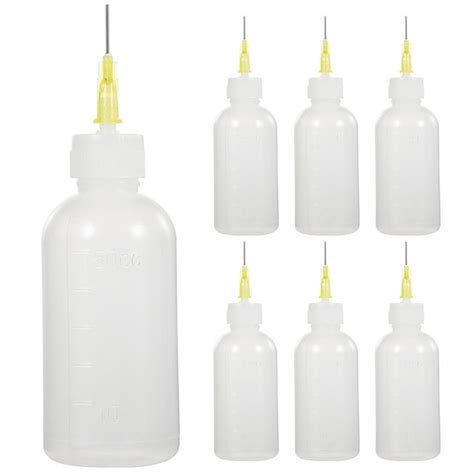The importance of precision liquid dispensing solutions cannot be overstated in various industries, including pharmaceutical, medical, laboratory, and manufacturing. The accuracy and reliability of liquid dispensing directly impact the quality of products, experiments, and treatments. Applicator bottles are a crucial component in achieving precise liquid dispensing, and their role in different applications is multifaceted. In this article, we will delve into the world of applicator bottles, exploring their benefits, working mechanisms, and the diverse range of applications they cater to.
Understanding Applicator Bottles
Applicator bottles are designed to dispense a specific volume of liquid with high accuracy and precision. They typically consist of a bottle, a cap, and a dispensing tip or applicator. The bottle itself is usually made of a durable, chemical-resistant material such as glass or HDPE (High-Density Polyethylene), while the cap and dispensing tip are precision-engineered to ensure accurate dispensing.

Key Features of Applicator Bottles
- Precise Dispensing: Applicator bottles are designed to deliver a precise amount of liquid, which is crucial in applications where a specific dosage or volume is required.
- Easy to Use: Most applicator bottles feature a simple, user-friendly design that allows for effortless dispensing.
- Minimizes Waste: By dispensing the exact amount of liquid needed, applicator bottles help reduce waste and save resources.
- Sterility: Many applicator bottles are designed with sterility in mind, making them ideal for use in medical, pharmaceutical, and laboratory settings.
Applications of Applicator Bottles
Applicator bottles have a wide range of applications across various industries. Their precision, ease of use, and ability to minimize waste make them an essential tool in many different settings.
Medical and Pharmaceutical Applications
In the medical and pharmaceutical industries, accuracy is paramount. Applicator bottles are used to dispense precise amounts of medication, sera, or vaccines. They are particularly useful in applications where small volumes are required, such as in ophthalmic or otic preparations.

Laboratory Applications
In laboratory settings, applicator bottles are used to dispense reagents, buffers, or other chemicals with high precision. This is particularly important in applications such as PCR (Polymerase Chain Reaction), where small volumes of reagents are critical.
Manufacturing Applications
In manufacturing, applicator bottles are used in quality control, where precise amounts of chemicals or substances are required for testing or calibration. They are also used in the production of various products, such as cosmetics, where precise dosing is critical.
Benefits of Using Applicator Bottles
The benefits of using applicator bottles are numerous and significant. By ensuring precise dispensing, applicator bottles help reduce errors, waste, and costs. They also contribute to improved productivity and efficiency in various applications.
Improved Accuracy
Applicator bottles ensure that the correct amount of liquid is dispensed, reducing the risk of errors or contamination.
Reduced Waste
By dispensing the exact amount of liquid required, applicator bottles help minimize waste and save resources.
Increased Efficiency
Applicator bottles are designed for ease of use, making them an efficient tool in various applications.

Choosing the Right Applicator Bottle
Choosing the right applicator bottle for your application is critical. Consider the following factors when selecting an applicator bottle:
Material Compatibility
Ensure that the applicator bottle is made of a material that is compatible with the liquid being dispensed.
Precision Requirements
Consider the level of precision required for your application. Applicator bottles are available with different levels of precision, from simple dispensing tips to highly accurate micropipettes.
Volume Requirements
Choose an applicator bottle that can handle the volume of liquid required for your application.
Regulatory Compliance
Ensure that the applicator bottle meets regulatory requirements, such as those related to sterility or chemical resistance.






Conclusion
Applicator bottles are a crucial component in precision liquid dispensing solutions. Their ability to deliver precise amounts of liquid, ease of use, and minimization of waste make them an essential tool in various industries. By understanding the benefits, working mechanisms, and applications of applicator bottles, users can make informed decisions when selecting the right applicator bottle for their needs.
What are applicator bottles used for?
+Applicator bottles are used for precision liquid dispensing in various industries, including pharmaceutical, medical, laboratory, and manufacturing.
What are the benefits of using applicator bottles?
+Applicator bottles offer improved accuracy, reduced waste, and increased efficiency in various applications.
How do I choose the right applicator bottle for my application?
+Consider material compatibility, precision requirements, volume requirements, and regulatory compliance when selecting an applicator bottle.
